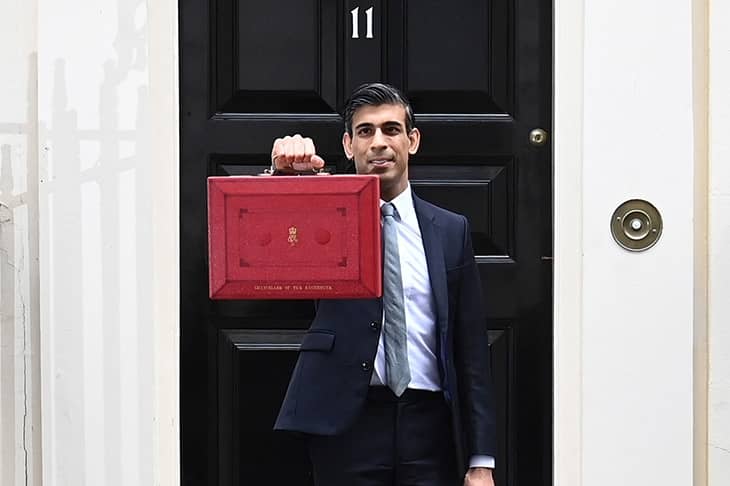The Budget and the spending review gave the clearest indication yet of what the post-Covid government might look like. During the height of the pandemic, government spending exceeded 50 per cent of the economy for the first time since 1945-46. Even this year, public spending will be higher than when Denis Healey had to seek a bailout from the International Monetary Fund in 1976. Such spending has long-lasting consequences. The tax burden is now at its highest level in terms of GDP since the 1950s and is likely to stay high for some time.
It will take quite an effort to return the government to its pre-pandemic size. The risk is that the UK’s ageing population will make this task particularly difficult. The National Insurance increase to fund more spending on the NHS and social care was a worrying sign of the way things could go. It is all too easy to see how the UK could get stuck with high taxes with spending concentrated on healthcare rather than on productive investment. The NHS accounted for 27 per cent of day-to-day government spending in 1999/2000: that is on course to rise to 44 per cent in three years’ time.
The Budget offered some reassurance on how high the tax burden will go. Boris Johnson and Rishi Sunak have always been keen to stress that they are low-tax Conservatives — declarations that have previously sounded a bit like St Augustine’s prayer for the Lord to make him virtuous, but not yet. Yet this week’s announcement that the universal credit taper rate will be cut from 63 pence to 55 pence is a significant tax cut and one aimed at those most in need of it.
When the Tories were in opposition, David Cameron railed against the 96 per cent marginal tax rate facing people moving from welfare into work. Universal credit, introduced by the coalition government, was meant to solve this problem. Some progress was made on this front, but the working poor still faced a far higher marginal tax rate than those paying the top rate of tax. Faced with the expense of moving to this new system, George Osborne kept the taper rate high, blunting the purpose of the reform, which was supposed to ensure that work always paid. As Cameron admitted in his final conference speech as party leader: ‘Nearly two thirds of children in poverty have parents who are in jobs. For them, work hasn’t worked.’
This week’s change to the taper rate is welcome. But it is worth remembering that even the new level is higher than the 47 per cent rate faced by those earning over £150,000. The lower taper means that most full-time workers will gain more from this change than they will lose from the end of the £20 uplift to universal credit, which was introduced as an emergency measure during the pandemic.
Sunak’s declared goal that taxes will decline by the end of this parliament is dependent on many factors. His plans could easily be wiped out by a combination of higher inflation and raised interest rates. Then there is the question of whether the government can maintain discipline on the public finances: the Tory party has not been this keen on big government since pre-Thatcher times.
Sunak’s spending review certainly did show restraint. There was some more money for education, but the package falls far short of what the government’s former education catch-up tsar, Kevan Collins, has called for.
The prioritisation of health over education is a reminder that the NHS backlog (1.8 million people have now been waiting more than 18 weeks for an operation) has more salience than the lost learning from the pandemic. Another concession to political reality was the freeze in fuel duty — if Sunak had raised it at a time when pump prices are at an all-time high, he would have been ‘brave’ in the Yes Minister sense of the word.
Fuel duty has been frozen for more than a decade and has become like council tax revaluation, a tax change that has been put off for so long that it has now become impossible. However, fuel duty will become less relevant in the coming years. The government wants to stop any new petrol or diesel cars from being sold after 2030. In a decade’s time, fuel duty will have to be replaced by a different form of taxation; most likely something akin to the system of road pricing that Matthew Parris argued for in last week’s magazine.
The announcement that banks will pay a reduced surcharge on their corporation tax is an easy target for Labour to attack. But if the surcharge had been kept at that level along with the big increase in corporation tax, it would have damaged the City of London’s competitiveness. At a time when Brexit is already providing challenges for the City, this would not have been sensible.
There are questions about whether it is wise for the government to leave in place the cap on bankers’ bonuses that the European Union introduced in 2014. Ninety-five millionaire bankers left the UK in 2019. This might not be an obvious cause for public concern, but they will have taken their tax revenue with them, so losing them is bad news for the public purse. The UK tax base is unusually reliant on a small number of very well-paid people: the top 0.1 per cent of earners contribute 12 per cent of all income tax.
The European Banking Authority calculates that the UK still had more than 70 per cent of the highest-paid bankers in Europe at the end of 2019. The government would be well advised to ensure that it keeps as many of them living here as possible. Scrapping the cap is one way to help do that. It seems particularly odd to keep it in place considering that in 2013 the UK government lodged a legal challenge with the European Court of Justice to try to stop the measure being introduced in the first place.
The delight the Tory party now takes in raising the minimum wage — which went up again in this statement — shows the shift that has taken place in Tory economic thinking. But the taper rate cut is the first step towards reducing the tax burden and is a sign that the Tory party still understands the dangers of a high-tax economy.
Got something to add? Join the discussion and comment below.
Get 10 issues for just $10
Subscribe to The Spectator Australia today for the next 10 magazine issues, plus full online access, for just $10.
You might disagree with half of it, but you’ll enjoy reading all of it. Try your first month for free, then just $2 a week for the remainder of your first year.















Comments
Don't miss out
Join the conversation with other Spectator Australia readers. Subscribe to leave a comment.
SUBSCRIBEAlready a subscriber? Log in